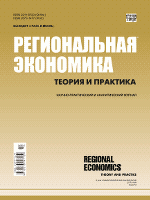Abstracting and IndexingРИНЦReferativny Zhurnal VINITI RAS Worldcat LCCN Permalink Google Scholar Online availableEastvieweLIBRARY.RU Biblioclub |
Tax incentives for investment activity of industrial enterprises as a condition of balanced economic growth of regions
Available online: 5 August 2014 Subject Heading: Taxes and taxation JEL Classification: Pages: 26-32
In article it is noted that modern conditions of development of a business environment not only in Russia, but also abroad, distinctly show transition tendencies from traditional industrial economy to the post-industrial economic relations and information society. Practically all aspects of activity in new socioeconomic reality will be based on knowledge, as a key condition of preservation and an evolyutsionirovaniye the World System, and also the regional social and economic systems forming national economy. In the certain more developed countries process of post-industrialization was started in the last quarter of the XX century the Russian Federation which economy is characterized by transitivity, on the contrary, only forms post-industrial economic and public basis. Thus the national economy and regional economy are characterized by existence of massive industrial and production sector, but the reduced investment potential. However, as many researchers note, and authors of article completely agree with them, existence of high investment activity and sufficient investment potential in sectors national and regional economy needs to be considered as one of the most important conditions of transition to innovatively focused development as the producing and introduction of innovations is axiomatically characterized by a high capital intensity. However at the same time investment of capital and resources in creation of innovations allow investors to gain higher income. The presented research testifies to a significant role of the industry in regional economic development and predetermines need of increase of level of investment activity for industrial sector, including for acceleration of transition of this sector to innovatively focused development. It is offered to use tax incentives as one of the main tools of increase in investment activity of the regional industrial enterprises. Keywords: investments, industry, economic growth, regional development, investment activity, tax incentives References:
|
ISSN 2311-8733 (Online)
|
|








